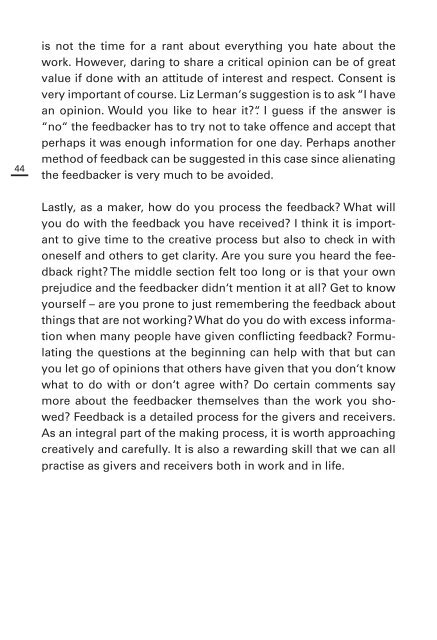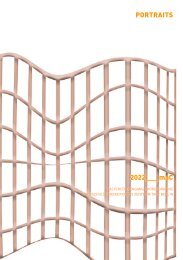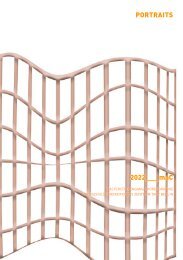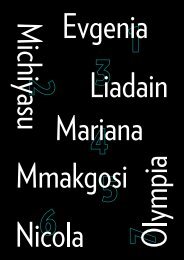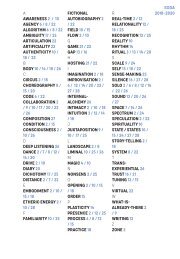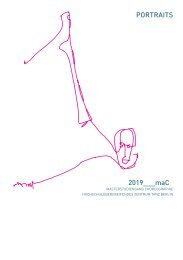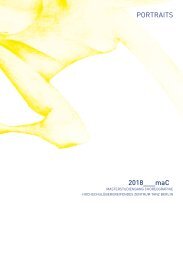Laboratory on Feedback in Artistic Processes 3
In its third edition the "Laboratory on Feedback in Artistic Processes" reflects on "Responses" within performing arts. The results of the previous Labs highlighted the need to take a closer look at the complexity and often subtle implications of feedback within the the artistic process itself. How do artist organise feedback and how do they process it? Who they want feedback from and what are its different roles? How can describe these relationships, and how does it shpae the artistic work? This booklet presents the different views on and experiences of feedback practices that were elaborated during the lab along the beforementioned questions and the insightfull contributions of its participants. Underpinning the following pages, three thematic fields have emerged: the impacts of feedback, feedback as a tool, and practicalities and contexts of feedback.
In its third edition the "Laboratory on Feedback in Artistic Processes" reflects on "Responses" within performing arts. The results of the previous Labs highlighted the need to take a closer look at the complexity and often subtle implications of feedback within the the artistic process itself. How do artist organise feedback and how do they process it? Who they want feedback from and what are its different roles? How can describe these relationships, and how does it shpae the artistic work?
This booklet presents the different views on and experiences of feedback practices that were elaborated during the lab along the beforementioned questions and the insightfull contributions of its participants. Underpinning the following pages, three thematic fields have emerged: the impacts of feedback, feedback as a tool, and practicalities and contexts of feedback.
You also want an ePaper? Increase the reach of your titles
YUMPU automatically turns print PDFs into web optimized ePapers that Google loves.
44<br />
is not the time for a rant about everyth<strong>in</strong>g you hate about the<br />
work. However, dar<strong>in</strong>g to share a critical op<strong>in</strong>i<strong>on</strong> can be of great<br />
value if d<strong>on</strong>e with an attitude of <strong>in</strong>terest and respect. C<strong>on</strong>sent is<br />
very important of course. Liz Lerman‘s suggesti<strong>on</strong> is to ask “I have<br />
an op<strong>in</strong>i<strong>on</strong>. Would you like to hear it?“. I guess if the answer is<br />
“no“ the feedbacker has to try not to take offence and accept that<br />
perhaps it was enough <strong>in</strong>formati<strong>on</strong> for <strong>on</strong>e day. Perhaps another<br />
method of feedback can be suggested <strong>in</strong> this case s<strong>in</strong>ce alienat<strong>in</strong>g<br />
the feedbacker is very much to be avoided.<br />
Lastly, as a maker, how do you process the feedback? What will<br />
you do with the feedback you have received? I th<strong>in</strong>k it is important<br />
to give time to the creative process but also to check <strong>in</strong> with<br />
<strong>on</strong>eself and others to get clarity. Are you sure you heard the feedback<br />
right? The middle secti<strong>on</strong> felt too l<strong>on</strong>g or is that your own<br />
prejudice and the feedbacker didn‘t menti<strong>on</strong> it at all? Get to know<br />
yourself – are you pr<strong>on</strong>e to just remember<strong>in</strong>g the feedback about<br />
th<strong>in</strong>gs that are not work<strong>in</strong>g? What do you do with excess <strong>in</strong>formati<strong>on</strong><br />
when many people have given c<strong>on</strong>flict<strong>in</strong>g feedback? Formulat<strong>in</strong>g<br />
the questi<strong>on</strong>s at the beg<strong>in</strong>n<strong>in</strong>g can help with that but can<br />
you let go of op<strong>in</strong>i<strong>on</strong>s that others have given that you d<strong>on</strong>‘t know<br />
what to do with or d<strong>on</strong>‘t agree with? Do certa<strong>in</strong> comments say<br />
more about the feedbacker themselves than the work you showed?<br />
<strong>Feedback</strong> is a detailed process for the givers and receivers.<br />
As an <strong>in</strong>tegral part of the mak<strong>in</strong>g process, it is worth approach<strong>in</strong>g<br />
creatively and carefully. It is also a reward<strong>in</strong>g skill that we can all<br />
practise as givers and receivers both <strong>in</strong> work and <strong>in</strong> life.


